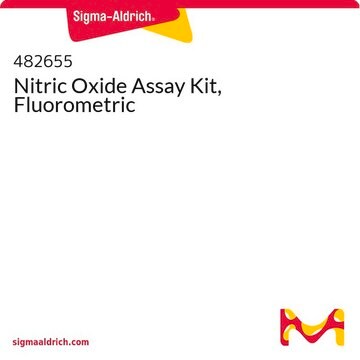03553
Griess′ reagent for nitrite
for microscopy
Synonym(s):
Griess-Ilosvays Reagent for nitrate, Lunge’s Reagent
Sign Into View Organizational & Contract Pricing
All Photos(1)
About This Item
Recommended Products
grade
for microscopy
form
liquid
impurities
2-naphthylamine
acetic acid
refractive index
n20/D 1.353
density
1.037 g/mL at 20 °C
application(s)
food and beverages
general analytical
General description
The Griess reagent is used for the quantitative analysis of nitrite ions. Present nitrite (as well as nitrate) ions will form a pink diazo dye by diazonium coupling reaction with N-(1-Naphthyl)ethylenediamine. The concentration of nitrite (or nitrate) ions is proportional to the color intensity of the resulting red solution.
Signal Word
Danger
Hazard Statements
Precautionary Statements
Hazard Classifications
Carc. 1A - Eye Dam. 1 - Skin Corr. 1B
Storage Class Code
6.1C - Combustible acute toxic Cat.3 / toxic compounds or compounds which causing chronic effects
WGK
WGK 3
Flash Point(F)
Not applicable
Flash Point(C)
Not applicable
Personal Protective Equipment
dust mask type N95 (US), Eyeshields, Gloves
Choose from one of the most recent versions:
Already Own This Product?
Find documentation for the products that you have recently purchased in the Document Library.
Customers Also Viewed
Su Young Chae et al.
Biomaterials, 25(5), 843-850 (2003-11-12)
Pancreatic islets and insulinoma cells are particularly vulnerable to serious damage by cytotoxic nitric oxide (NO) and/or oxidative stress, most probably due to their low expression levels of antioxidant enzymes. This cellular damage has been regarded as one of major
Qing-Li Wu et al.
Journal of immunology (Baltimore, Md. : 1950), 182(11), 6771-6778 (2009-05-21)
The Emu-TCL1 transgenic mouse spontaneously develops a CD5(+) B cell lymphoproliferative disorder similar to human chronic lymphocytic leukemia (CLL). Given the ineffectual T cell antitumor responses in this mouse model of CLL, we sought to determine whether combined treatment with
A Campos-Neto et al.
Journal of immunology (Baltimore, Md. : 1950), 160(5), 2037-2041 (1998-03-14)
It has been proposed that the induction of cellular immunity and resistance to intracellular pathogens is dependent upon CD40 ligand (CD40L). In the present study we show that this proposal is not ubiquitously supported. Mice genetically deficient in CD40L (CD40LKO)
Anne M Sanders et al.
BMC cancer, 10, 121-121 (2010-04-02)
Spontaneous Regression/Complete Resistant (SR/CR) mice are a colony of cancer-resistant mice that can detect and rapidly destroy malignant cells with innate cellular immunity, predominately mediated by granulocytes. Our previous studies suggest that several effector mechanisms, such as perforin, granzymes, or
Lei Qiu et al.
Immunology, 128(1 Suppl), e325-e334 (2008-11-20)
Using two-dimensional sodium dodecyl sulphate-polyacrylamide gel electrophoresis, we found that copper/zinc superoxide dismutase (Cu/Zn-SOD, SOD-1) was induced in constructed CCR5 stably transfected HEK 293 cells, but not in mock cells, treated with CCL5. CCL5-induced SOD-1 expression was also confirmed in
Our team of scientists has experience in all areas of research including Life Science, Material Science, Chemical Synthesis, Chromatography, Analytical and many others.
Contact Technical Service









